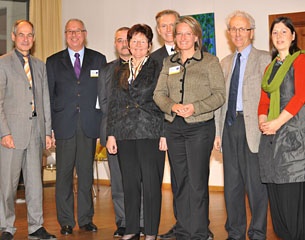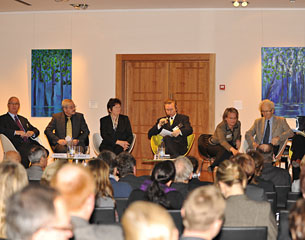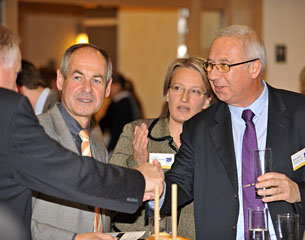
On 10 November 2010 horses were the centre of attention at the Representation of the State of Baden-Wuerttemberg to the European Union in Brussels. "Horses, a European Heritage:
The cultural heritage of Europe’s National Studs. Preserving resources, innovating traditions" was the theme of the reception with opening of the equally titled exhibition, which attracted 170 visitors from politics and the horse sector.
In his opening words Rudolf Koeberle, Baden-Wuerttemberg’s Minister for Rural Areas, Food and Consumer Protection, pointed out the significance of the state studs for the development of rural areas and complimented the curators for successfully presenting natural environments in the centre of the EU-metropolis.
Dr. Astrid von Velsen-Zerweck, director of Baden-Wuerttemberg’s state stud Marbach, demonstrated in her illustrative presentation the historic, actual and future significance of the stud as place of tradition, innovation and competence. She also introduced the European State Studs Association (ESSA), whose office is located at Marbach. 23 of Europe’s leading state studs from 13 countries have established a network and campaign for the preservation of their cultural heritage. Moreover, the studs cooperate in the fields of horse breeding, education, research, marketing and tourism. The exchange of genetic material facilitates the protection of endangered breeds. “To fulfil their various tasks, the state studs need to preserve their independence, which is not always possible in private economy” said von Velsen-Zerweck.
 In his speech “Equine Research and Knowledge Transfer in Europe” Dr. Ing. William Martin- Rosset, president of the INRA Equine Science Board, emphasised on the state studs’ importance as research partners and expressed his wish for more research projects of European scale.
In his speech “Equine Research and Knowledge Transfer in Europe” Dr. Ing. William Martin- Rosset, president of the INRA Equine Science Board, emphasised on the state studs’ importance as research partners and expressed his wish for more research projects of European scale.
Jan To?njes, vice editor of the leading German equestrian magazine “St. Georg”, guided skilfully through the programme and in his position as moderator he drew interesting statements out of the participants of the panel discussion.
Dr. Alf-Eckbert Fu?ssel, who in the DG SANCO unit of the European Commission is occupied with regulations for animal breeding and welfare, reported to have gained his first horse- riding experiences at the Saxon state stud Moritzburg. To the question whether a uniform EU-horse will be a breeding-goal of the future, he resolutely replied “No, the contrary is the case. Our aim is the preservation of biological diversity. Especially endangered breeds benefit from cross-border breeding and a reduction of bureaucratic obstacles between the European states.”
Elisabeth Jeggle, member of the European Parliament and originating from Baden- Wuerttemberg, invited the audience to visit the state stud on the Swabian Alb. “In Marbach one can learn a lot, especially when coming from Brussels. The stud works from yesterday today for the future.”
 With regard to the lack of financial support Bernard Maurel, European delegate of the French stud administration IFCE and ESSA-president, provoked with the question, if the heritage of Europe’s state studs was less worth than for instance music or theatre.
With regard to the lack of financial support Bernard Maurel, European delegate of the French stud administration IFCE and ESSA-president, provoked with the question, if the heritage of Europe’s state studs was less worth than for instance music or theatre.
In reaction Katerina Xethali, who in the EU culture programme is responsible for cooperation projects, announced that the European State Studs Association might be under the beneficiaries of future European funding. “The fish-economy already received a grant from the culture programme, maybe horses come next.”
The evening concluded with specialities from Baden-Wuerttemberg’s kitchens and vine cellars, which were enjoyed viewing the exhibition. Statues of merited stallions and precious items from the Marbach stud museum were admired and in the saddlery and black smith workshops one could experience traditional hand craft. A part of the exhibition was dedicated to horse feed. Here the chalk board of the famous stallion “Julmond” was displayed, who came to Marbach from East Prussia after World War II and became one of the fathers of modern Baden-Wuerttemberg Warmblood Horses.
Photos © Kube
Related Links
2010 General Assembly and Reception of European State Stud Association
European state studs recognized as European cultural heritage